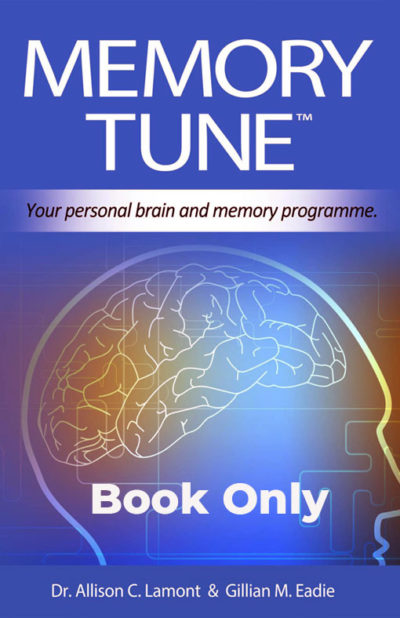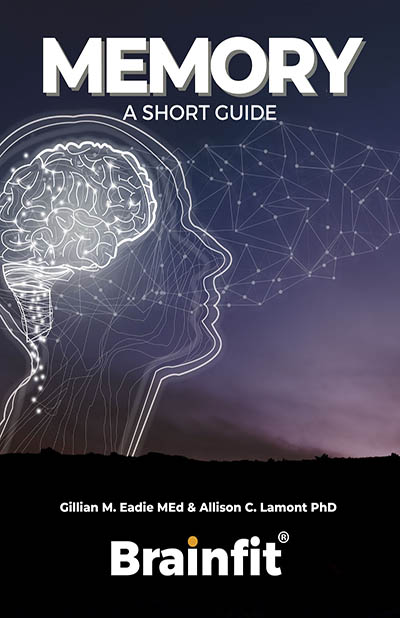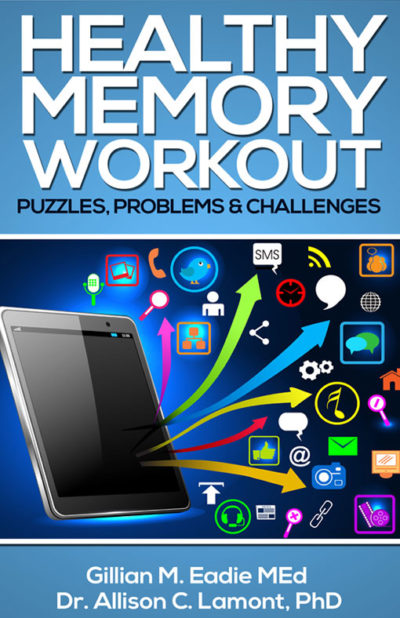It is NEVER too late to take steps to prevent memory loss.
A good place to start is this report from Harvard.
All commonsense, really – but it always helps to check them off now and again.
Seven preventive steps
Research shows that the following strategies may help preserve your memory.
Exercise
Physical fitness and mental fitness go together. People who get regular vigorous exercise also tend to stay mentally sharp in their 70s and 80s. There are several ways in which exercise might benefit your memory. First of all, it’s good for the lungs, and people whose memories and mental acuity remain strong in old age characteristically have good lung function. Second, exercise helps reduce the risk for diabetes, high cholesterol, high blood pressure, and stroke – illnesses that can lead to memory loss. And finally, animal research has shown that exercise increases the level of neurotrophins, substances that nourish brain cells and help protect them against damage from stroke and other injuries.
Researchers don’t know precisely how much exercise is needed for good mental health. The available research suggests that the exercise needn’t be extreme, but should be regular. The people in the MacArthur study whose mental functions remained strong were active almost daily. A study from Case Western Reserve University School of Medicine concluded that individuals who exercised – by walking or by engaging in physically active hobbies, such as gardening – had a lower risk for Alzheimer’s disease. So experts recommend that you build physical activity into your daily routine. Here are some examples:
- When possible, walk instead of driving or riding.
- Set aside time each day for exercise – for example, a half-hour walk around the neighborhood. For motivation, ask your spouse or a friend to go with you.
- Use the stairs instead of elevators.
- Exercise at home, possibly with an exercise video.
- Plant a garden.
- Take an exercise class or join a health club.
- Swim regularly, if you have access to a pool or beach.
- Learn a sport that requires modest physical exertion, such as tennis. If you haven’t been physically active recently, check with your doctor first.
Keep learning
In the MacArthur study, the characteristic that correlated most strongly with good mental functioning in old age was a person’s level of education. Experts think that advanced education may help keep memory strong by getting people into the habit of being mentally active. Regardless of your level of education, you, too, can be an active, lifelong learner. Some people continue their education with adult education classes or advanced degrees even in late adulthood. But efforts don’t have to be so ambitious to be beneficial. Reading regularly, keeping up with current affairs, learning a new hobby, and playing challenging games all exercise your mind. (See “Challenge your mind” for practical ways to keep learning.)
Don’t smoke
Studies show that smokers don’t remember people’s names and faces as well as nonsmokers do. No one knows whether smoking directly impairs memory or is merely associated with memory loss because it causes illnesses that contribute to memory loss. Smoking is especially common among people who are depressed, and depression weakens the memory. In addition, smoking increases the risk for stroke and hypertension, two other causes of memory impairment.
Smoking can interfere with memory in other ways, too. For one thing, it damages the lungs, and good lung function is one of the characteristics of people whose memories stay strong in old age. In addition, smoking constricts the blood vessels to the brain, depriving it of oxygen and possibly harming neurons.
Maintain a healthy diet
A healthful diet rich in fruits and vegetables as well as healthy fats from fish, nuts, and whole grains is vital in maintaining the health not just of your body but of your brain as well. Avoiding saturated fats (in meat and dairy) and trans fats (in commercial products with partially hydrogenated oils) will help keep your arteries clear and cholesterol levels healthy, and that in turn will decrease your chances of stroke, including the small undetectable ones that can damage brain function. Avoid excess calories to maintain a normal weight; this lowers your risk for illnesses such as diabetes and hypertension, which can impair your memory.
Eating a lot of fruits and vegetables can be especially beneficial because many are good sources of antioxidants, nutrients that may protect against diseases and age-related deterioration throughout the body.Nutritious foods such as fruits, vegetables, and nuts are essential for keeping your brain healthy.
Get a good night’s sleep
Sleep is essential for memory consolidation as well as overall health. Although people vary widely in their individual sleep needs, research suggests that six to eight hours of sleep a night is ideal. Perhaps even more important than the amount of sleep is the quality of sleep. People with breathing problems during sleep, such as obstructive sleep apnea, can sleep for 10 hours per night but never feel refreshed in the morning. Of course, for some people, getting a good night’s sleep is easier said than done, especially because insomnia becomes more common with age. But certain habits can help. For example, try the following:
- Establish and maintain a consistent sleep schedule and routine. Go to bed at the same time each night and wake up at the same time each morning. A set sleep routine will “train” you to fall asleep and wake up more easily.
- Plan to do your most vigorous exercise early in the day. Exercising in the hours immediately before bedtime causes physiological changes that interfere with sleep. Exercising in the morning, on the other hand, enhances your alertness when you need it most – at the beginning of the day.
- Avoid coffee and other sources of caffeine (e.g., chocolate, many soft drinks, some brands of aspirin, many types of tea) after midmorning, because caffeine is a stimulant that can keep you awake for hours afterward.
- Avoid napping during the daytime. Napping can disrupt your natural sleep cycle and prevent you from feeling tired enough to fall asleep at night.
- Don’t take sleeping pills unless nothing else works. Like sleep deprivation, sleeping pills can cause memory loss.
- Try drinking warm milk before bedtime. Some people find that it helps them feel sleepy. Milk contains tryptophan, a chemical that may help you relax.
- Don’t try to sleep if you’re not tired; otherwise you’ll set yourself up for tossing and turning. If you’re still awake after about 20 minutes in bed, get up and read awhile to help yourself relax.
- If you experience persistent sleep problems, consult your physician so that you can find out what’s wrong and get treatment if needed.
Consider taking vitamins
For several years, experts have thought that antioxidant vitamins, such as vitamins C and E and beta carotene, might benefit memory by neutralizing free radicals, destructive molecules that damage healthy tissue in the body. Free radical damage has been found in the brains of patients with Alzheimer’s disease, prompting researchers to speculate that it may contribute to the memory impairment and other symptoms of the disease. The findings have been mixed, but research suggests that some antioxidants might convey some benefits in the treatment of age-related memory loss and some forms of dementia, although not against Alzheimer’s disease.
A large study suggested that vitamin E, but not the other antioxidants, may help slow the rate of age-related mental decline. This study, which was published in Archives of Neurology in 2002, looked at 2,889 people ages 65 and older who did not have dementia or other cognitive illness. Researchers asked the study participants what they ate and which vitamin and mineral supplements they took, then tracked their mental function over about three years. Mental function was assessed with the Modified Mini-Mental State Examination and other standard tests. Participants who consumed the most vitamin E had 36% less mental decline than did people who consumed the least.
In contrast, a study published in Archives of Neurology in 2003 found no association between antioxidant intake and later development of Alzheimer’s disease. This study included 980 people ages 65 and older who did not have dementia when the study began. Researchers asked the participants about their diet and supplement use, then followed the people for four years to see who developed Alzheimer’s. At the end of the study, the people who consumed the largest amounts of vitamins C and E and beta carotene were no less likely to develop Alzheimer’s than the people who consumed the smallest amounts.
However, an earlier study found that vitamins C and E might protect against some forms of dementia – vascular dementia, which is related to stroke, as well as so-called mixed/other dementia, which includes dementia caused by Parkinson’s disease. In this study, which included 3,385 Japanese American men ages 71-93, those who reported taking vitamin C and E supplements had an 88% lower incidence of vascular dementia compared with those who didn’t take the supplements. Like the more recent study, this one found no relationship between these vitamins and the incidence of Alzheimer’s.
This study also found that the rate of dementia was lowest among men who had taken vitamins C and E the longest, which suggests that long-term use is important for helping to preserve mental function in old age. Vitamins C and E are generally safe and nontoxic. However, if you have a rare vitamin K deficiency that affects blood coagulation or if you take anticoagulant medicine, you should check with your doctor before taking these vitamins. Vitamins C and E can complicate these conditions by promoting anticoagulant action. Patients with any other form of bleeding disorder should also consult their physician before taking these supplements.
Cultivate social support
Social support – that is, close ties with others – can improve the mental performance of older people, according to the MacArthur study on aging and other research. Social support can come from friends, relatives, or caregivers, but to be truly supportive, relationships must make people feel good about themselves.
Not all relationships are beneficial. The MacArthur researchers described a study in a nursing home in which residents were asked to do a simple jigsaw puzzle. During a practice session, one group was given verbal encouragement by one of the experimenters as they practiced doing the jigsaw puzzle. The second group was told how to do the jigsaw puzzle. The third group got no social support or how-to advice. Later, when they took a test in which they did a puzzle on their own, those in the group given encouragement did better than they had during the practice session. The people who had been told what to do had more trouble during the test than they’d had in the practice session. And those who had received neither encouragement nor advice did neither better nor worse.
The results of this study suggest that social support can improve a person’s performance on particular mental tasks, but only if the support promotes the person’s self-confidence. Being too quick to show a person what to do can lower that person’s self-confidence and motivation to figure things out. In other words, it can instil a sense of helplessness. The lesson for older people is to seek out the company of people who will encourage them to keep on trying. The lesson for children and caregivers is to resist the impulse to jump in and do things for older people that they are capable of doing for themselves.
See also the companion article How to Remember Things
(This article was first printed in the Harvard Health Publications Special Health Report “Improving Memory: Understanding and Preventing Age-Related Memory Loss”.





